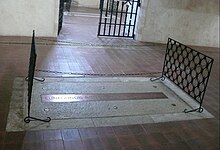Kunigunde of Hohenstaufen
| Kunigunde of Hohenstaufen | |
|---|---|

Kunigunde's tomb at the Convent of St Agnes of Bohemia
|
|
| Queen consort of Bohemia | |
| Tenure | 1230–1248 |
| Born | February or March 1202 Swabia, Germany |
| Died | 13 September 1248 (aged 47–48) Prague, Bohemia |
| Burial | Convent of St Agnes of Bohemia in Prague |
| Spouse | Wenceslaus I of Bohemia |
| Issue |
Vladislaus, Margrave of Moravia Ottokar II of Bohemia |
| House |
House of Hohenstaufen (by birth) Přemyslid dynasty (by marriage) |
| Father | Philip of Swabia |
| Mother | Irene Angelina |
Vladislaus, Margrave of Moravia
Kunigunde of Hohenstaufen or Kunigunde of Swabia (German: Kunigunde von Staufen or Kunigunde von Schwaben, Czech: Kunhuta Štaufská or Kunhuta Švábská) (February/March 1202 – 13 September 1248) was the third daughter of Philip, Duke of Swabia and his wife, Irene Angelina.
She and her three sisters were orphaned in 1208; that year, her father was murdered, and a few months later her mother died following the birth of a fifth daughter, who did not live either.
Kunigunge soon moved to Prague, where her fiancé Wenceslaus lived. He was the eldest surviving son of Ottokar I of Bohemia and his second wife Constance of Hungary. (Constance was a daughter of Béla III of Hungary and Agnes of Antioch ). In 1224, Kunigunde married Wenceslaus. They were crowned in 1228.
In 1230, Wenceslaus succeeded his father as King of Bohemia, with Kunigunde as his queen consort. However, Queen Kunigunde seems to be not important in politics, although she was the founder of monasteries. They had five children:
When Wenceslaus' childless brother Přemysl, Margrave of Moravia died in 1239, the sons of Wenceslaus and Kunigunde were the only chances for the survival of the House of Přemysl. The first-born son Vladislaus died in 1247. His mother probably mourned for him less than his father, who was heartbroken.
In 1248, the younger son Přemysl was enticed by discontented nobles to lead a rebellion against his father. Queen Kunigunde stayed in Prague, but died during this revolt on 13 September 1248. Neither husband nor son attended her funeral. She was buried in the Agnes nunnery.
The rebellion was defeated and Ottokar was imprisoned by his father, but released shortly afterwards.
...
Wikipedia
